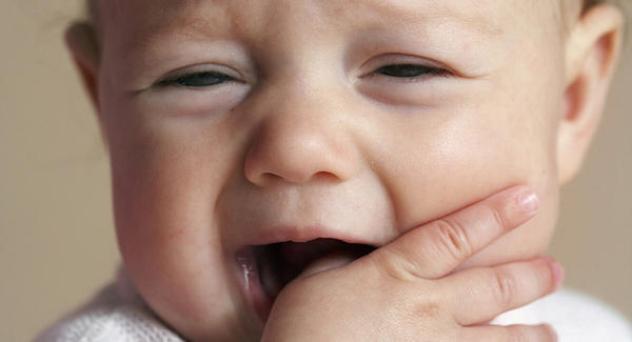Teething happens when the teeth develop through the gums. It can be frustrating time for parents, as infants and youngsters can become disturbed when they teethe. There are measures which help to treat symptoms of teething in your infant or kid. These incorporate utilizing cooled teething rings furthermore some teething gels.
Despite the fact that the milk teeth forms when the infant is developing in the womb, the teeth just begin to develop all through the gums when the infant is 6-9 months old. At the point when the teeth develop, exceptional chemicals are discharged by the body, which causes part of the gums to seperate thus permits the teeth to become through.
The teeth develop all through the gums in stages. Typically the lower front teeth come through initially, followed by the top center teeth. Other teeth take after over the next months. A child is usually aged around 2½ or 3 when they have their full arrangement of first teeth.

Remedies for Teething Fever and Diarrhea in Babies
If you are worried about the teething process of your little one and want to know more about common symptoms associated with this process, then continue reading:
Symptoms of teething
Infants and children can differ significantly with the expressions they can have when they are teething. For some infants, teething prompts gentle signs that simply last a couple days. Nonetheless, for others, teething is difficult and can last any longer. Side effects of teething regularly happen a couple days (or even weeks) before the tooth gets through the gum.
Common symptoms and signs include:
- Red and swollen gums.
- The need to gnaw
- Puffy gums
- Excessive drooling
- Fussiness, especially at night
- A change in eating habits
- Red cheek or face.
- Ear pulling
- Inconsistent feeding.
- Rubbing their gums
A very mild rise in temperature may possibly be a symptom of teething. Diarrhea is also a situation generally found in growing babies. When baby start teething, diarrhea can cause bacterial infections and dehydration in a baby, which is why it is important to take measures against these.
Is Diarrhea a Symptom of Teething?
It is still under speculation in the matter of whether there is any immediate connection amongst teething and diarrhea. By and large when a child begins teething, diarrhea is normally followed. This causes the parents to think that the two incidents are directly associated to one another also with headgear braces.
Though, doctors are of the strong conviction that this is not the case. Even the thought that the excess drool in a baby’s gums caused by teething somehow affects the gastrointestinal system is a big shot in the dark. There is little proof that these two occurrences naturally correspond.
The most typical clarification for this is that when an infant is teething he or she tends to get irregular things and place them in the mouth. This prompts certain undesirable germs entering the body. These microscopic organisms would have not discovered their way in body.
The most ideal approach to maintain a strategic distance from such circumstances is to take care of your child at all times. It is basic to ensure your youngster is just putting clean, without germ things in his or her mouth to sooth the torment. By keeping the undesirable germs under control, you can abstain from teething diarrhea.
Treatment for teething
Many babies and children will have minimal or no symptoms when they are teething. However, the following may be useful for those who are having symptoms:
Common advice
Gently rubbing with clean finger on the affected gum may ease the pain. Numerous kids find that gnawing on a clean and cool object is calming like a chilled teething ring or a perfect, icy, wet wool. Biting on chilled natural product or vegetables may offer help. In any case, teething biscuits should be avoided as they contain sugar.
Pain killer
If the child is in pain with teething, then giving paracetamol or ibuprofen may offer assistance. These ought to be given at the prescribed measurements for their age.
Teething gels
There are teething gels accessible which contain local analgesic or antiseptic. Experts advise against using these gels for teething pain. This is because there is not much proof that they assist for very long and there is proof that they can cause damage.
There have been a number of cases where a baby has accidentally gulp too much of the anaesthetic and had serious consequences, including death. If you do choose to use a teething gel, follow the manufacturer’s instructions closely to be sure it is safe.


